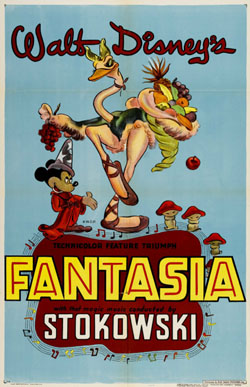 Fantasia posed a problem for the Music Department at the Walt Disney studio.
Fantasia posed a problem for the Music Department at the Walt Disney studio.
The use of classical music–all safely in the Public Domain–meant that the Music Department would not be able to contribute a dime to Disney’s coffers.
There would be no opportunity for Larry Morey or Ned Washington to write a catchy lyric. You’re gonna set a lyric to “Night On Bald Mountain”??
As for the various record companies–those that had large catalogues of classical music–they could try to promote these catalogues along with the film–if the snobbish clientele for symphonic and concert music did not object too strongly.
Here, both Disney and Victor Records had a not-so-secret ace in the hole: Leopold Stokowski.
“Stoky” was, to put it bluntly, the best-known of all symphony conductors. He had worked with the Philadelphia Orchestra as far back as 1912, and had built the Philadelphia Orchestra into one of the finest symphony groups in the world.
What’s more, he had been recording for Victor with the Philadellphia Orchestra since 1917, and some of these records were steady sellers, accumulating sales over the years as new customers wanted to build a repertoire of classical records–which they then wouldn’t play!
So, when it was time to sit down and brainstorm about what classical pieces to include in “Fantasia”, it’s no wonder that Stokowski went in for some favorites–as well as a couple of pieces that he had not recorded before.
Bach’s “Toccata and Fugue in D-Minor was one of “Stoky”‘s favorites. He had recorded it for Victor–most famously in 1934.
Tschaikowsky’s “Nutcracker Suite” was another favorite of Leopold. He had recorded it twice for the Victor–once in 1927, and again in 1934.
“The Rite of Spring” (“Le Sacre du Printemps”) showed Stoky’s love of modern music. He had recorded it for the Victor in 1930.
“The Sorcerer’s Apprentice” had been recorded commercially for Victor late in 1937,with the Philadelphia Orchestra. This was not long before Stokowski came out here and led a picked group of Hollywood studio musicians in what would become the soundtrack for Mickey Mouse’s contribution to “Fantasia”. (All the other parts of the symphonic score were recorded in 1940 with the Philadelphia Orchestra–with which Stoky was about to sever his bonds for the rest of his career.
Leopold did not record Mussorgsky’s “Night On Bald Mountain” with the Philadelphia–except for the soundtrack of “Fantasia”. Soon afterward, he recorded it commercially with his own organization: the All-American Youth Orchestra–under his new contract with Columbia records.
Another piece that he did not record commercially with the Philadelphia Orchestra was Beethoven’s “Pastorale” Symphony. He would record it in 1946 for RCA Victor, with “his” Symphony Orchestra’ a group made up of hand-picked men (many from the New York Philharmonic).
And he never got to make a commercial record–not in the 78-rpm era–of Ponchielli’s “Dance Of The Hours”. There’s a piece that owes its familiarity to a more modern generation to Allan Sherman’s use of it for Hello Muddah! Hello Faddah!.
To hear Stokowski’s conducting of the Philadelphia Orchestra, recorded in the revolutionary “Fantasound” process, in a big theater full of well-dressed gentry, must surely have been quite an experience in 1941.
Too bad so many of us are too young to have been at the Broadway Theater in Manhattan, or the Carthay Circle Theater in Hollywood. That would really have been something!


 James Parten has overcome a congenital visual disability to be acknowledged as an expert on the early history of recorded sound. He has a Broadcasting Certificate (Radio Option) from Los Angeles Valley College, class of 1999. He has also been a fan of animated cartoons since childhood.
James Parten has overcome a congenital visual disability to be acknowledged as an expert on the early history of recorded sound. He has a Broadcasting Certificate (Radio Option) from Los Angeles Valley College, class of 1999. He has also been a fan of animated cartoons since childhood.











































While a FANTASIA soundtrack album would have been impractical in the 78 rpm era, Victor did take out ads via local music dealers in some cities where FANTASIA was playing, advertising a group of records and albums of the musical selections heard in the film, drawn from Victor’s catalog. The ads were decorated with a drawing of Mickey Mouse in his Sorcerer’s Apprentice costume and read, “Walt Disney’s FANTASIA–Employing the magic miracle of RCA Fantasound, and yours for repeat performances on Victor records. See–hear–thrill to Walt Disney’s FANTASIA and remember you can make your memories of its magic music live for years with Victor Records”
The recordings Victor chose to promote in these ads were:
Bach: Toccata and Fugue in D Minor–Stokowski and the Philadelphia Orchestra (Victor 8697)
Tchaikovsky: The Nutcracker Suite–Stokowski and the Philadelphia Orchestra (Victor album M-265)
Dukas: The Sorcerer’s Apprentice–Stokowski and the Philadelphia Orchestra (Victor album M-717)
Stravinsky: Rite of Spring–Stokowski and the Philadelphia Orchestra (Victor album M-74)
Beethoven: Symphony No. 6 in F Major–Arturo Toscanini and the BBC Symphony Orchestra (Victor album M-417)
Ponchielli: Dance of the Hours–Arthur Fiedler and the Boston Pops Orchestra (Victor 11833)
Moussorgsky: Night on Bald Mountain–Albert Coates and the London Symphony Orchestra (Victor 11448)
Schubert: Ave Maria–Marian Anderson (Victor 14210)
Excellent article as always, James!
The piece of music that baffles me is “Ave Maria” because of the special lyrics written for Fantasia by Rachel Field (who I assume is the same person who wrote “All This Heaven Too”). We wanted to use it for our wedding, and Dave Smith was kind enough to send a copy of the sheet music, but the lyrics didn’t match the movie. To this day, I can’t fully understand the words, even in the digital version. (We did use “Love is a Song” in the wedding, though.)
I guess no one recorded the vocal version of Ave Maria outside the film.
Yes, same Rachel Field as ALL THIS AND HEAVEN TOO. I can’t find that anyone ever recorded Fields’ lyrics to “Ave Maria,” but they were published in book form. In 1940 Random House published AVE MARIA: AN INTERPRETATION FROM WALT DISNEY’S “FANTASIA,” which presents Fields’ lyrics set to Schubert’s music. The book is generously decorated with art from the film.
So… nobody rushed to record “Ave Maria” with the special Rachel Field lyrics written for the film?
In 1940 Random House published a hardbound volume of the Fields Ave Maria lyrics illustrated with production art from the segment. I’ve transcribed the lyrics from my copy:
Ave Maria! Now for your ageless bell
So sweetly sounds for listening ears.
From heights of heaven to brink of hell
Its tender notes have echoed through the years.
Aloft from earth’s far boundaries
Each poor petition, every prayer,
The hopes of foolish ones and wise
Must mount in thanks or grim depair.
Ave Maria!
Ave Maria! You were not spared
One pang of flesh, or mortal tear;
So rough the paths your feet have shared,
So great the bitter burden of your fear.
Your heart has bled with every beat.
In dust you laid your weary head,
The hopeless vigil of defeat
Was yours and flinty stone for bread.
Ave Maria!
Ave Maria, Heaven’s bride,
The bells ring out in solemn praise,
For you the anguish and the pride,
The living glory of our nights and days.
The Prince of Peace your arms embrace
While hosts of darkness fade and cower —
Oh, save us, Mother full of grace,
In life, and in our dying hour.
Ave Maria!
“Rite of Spring” was not, strictly speaking, Public Domain. But Stravinsky in later years claimed that Disney gave him a take-it-or-leave offer as the work was copyright in the USSR, which didn’t at the time have a copyright agreement with the USA.
More recently, when mainstream features highlighted classical music (“2001”, “10”, “Amadeus”, etc.) it became common for minor labels to package existing recordings on CDs of “Music From Hollywood Blockbusters”, presumably unburdened by any payment to studios. Did anybody eventually try that with “Fantasia”?
In the early ’70s, during Disney’s extended (and highly successful) reissue of FANTASIA, RCA released a two-disc “greatest hits from FANTASIA” album, with catalog material conducted by Ormandy, Ozawa, Fiedler, Leinsdorf and Shaw. [https://www.discogs.com/Various-Greatest-Hits-From-Fantasia/release/6348215] London Phase 4 brought out “Music From Walt Disney’s FANTASIA,” a single-disc collection of catalog recordings conducted by Camarata (someone who certainly knew his way around Disney music), Stanley Black, Bernard Herrmann (a sprightly “Sorcerer’s Apprentice”) and Stokowski himself. [https://www.discogs.com/Stokowski-Camarata-Herrmann-Black-Music-From-Walt-Disneys-Fantasia/release/1748044]
Disney also tried to capitalize on the new popularity of the 1940 film. The studio’s Vista label issued a single-disc, “Selections From Walt Disney’s FANTASIA,” featuring excerpts from the movie’s long available three-disc original soundtrack album. Al Dempster painted a memorable cover with sorcerer Mickey directing the heavens. [https://www.discogs.com/Leopold-Stokowski-And-Philadelphia-Orchestra-Selections-From-Walt-Disneys-Fantasia/release/4771779]
Just to make a note that not all the music used was of public domain. The author of The Rite of Spring, Igor Fyodorovich Stravinsky (1882 –1971) was alive. He even proposed Walt Disney to create a new composition for the movie and he refused as he liked the selected one. Furthermore, the studios acquire the rights of other composition of the author to be used in other Fantasia’s segments.
Stravinsky was furious with the adaptation and orchestration done by Stravinsky.